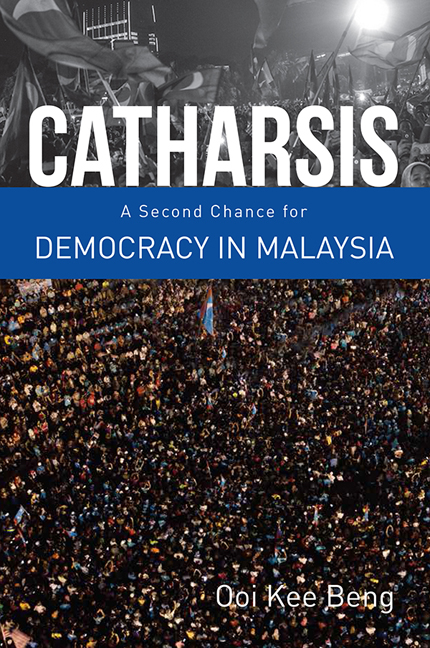Book contents
- Frontmatter
- Contents
- Foreword
- 1 Introduction – Malaysia's Future Is Redeemed
- Before Pakatan Harapan
- Before 9 May 2018
- With Mahathir at the Helm
- 31 One Thing Is Certain—There Will Be More Amendments to the Constitution
- 32 The More Things Change, the More Things May Actually Change
- 33 Did Merdeka Liberate or Create Malaya?
- 34 Interview with Nurul Izzah Anwar: Rebuilding a Nation Long Divided
- 35 The Diminishing of Humans Through Identity Politics
- 36 The Art of Dismantling Cultural Pluralism
- 37 No Need to Let Bigots Dictate Policy
- 38 What the Penang Floods Say About Malaysian Politics (and It's Not Just About Climate Change)
- 39 This is the Moment of Truth for Malaysia's Race-based Politics
- 40 We are Equal Only Through Our Vote
- 41 Why the Opposition Has a Shot at Toppling the Barisan Nasional with Mahathir at the Helm
- 42 Spiralling Back towards Reformasi
- 43 Individual Freedom Is a Matter of National Survival
- 44 Why Meet the Twenty-first Century with Twentieth Century Mindsets?
- 45 A Final Quarrel between a Repentant Grandfather and Oldfashioned Self-absorbed Parents
- 46 Outraged Enough to Go Vote or Cynical Enough to Stay Home?
- Beyond 9 May 2018
- About the Author
42 - Spiralling Back towards Reformasi
from With Mahathir at the Helm
Published online by Cambridge University Press: 12 February 2019
- Frontmatter
- Contents
- Foreword
- 1 Introduction – Malaysia's Future Is Redeemed
- Before Pakatan Harapan
- Before 9 May 2018
- With Mahathir at the Helm
- 31 One Thing Is Certain—There Will Be More Amendments to the Constitution
- 32 The More Things Change, the More Things May Actually Change
- 33 Did Merdeka Liberate or Create Malaya?
- 34 Interview with Nurul Izzah Anwar: Rebuilding a Nation Long Divided
- 35 The Diminishing of Humans Through Identity Politics
- 36 The Art of Dismantling Cultural Pluralism
- 37 No Need to Let Bigots Dictate Policy
- 38 What the Penang Floods Say About Malaysian Politics (and It's Not Just About Climate Change)
- 39 This is the Moment of Truth for Malaysia's Race-based Politics
- 40 We are Equal Only Through Our Vote
- 41 Why the Opposition Has a Shot at Toppling the Barisan Nasional with Mahathir at the Helm
- 42 Spiralling Back towards Reformasi
- 43 Individual Freedom Is a Matter of National Survival
- 44 Why Meet the Twenty-first Century with Twentieth Century Mindsets?
- 45 A Final Quarrel between a Repentant Grandfather and Oldfashioned Self-absorbed Parents
- 46 Outraged Enough to Go Vote or Cynical Enough to Stay Home?
- Beyond 9 May 2018
- About the Author
Summary
The return of former prime minister Tun Dr Mahathir Mohamad to the forefront of Malaysian politics at the age of 92 – 19 years after he sacked his deputy Datuk Seri Anwar Ibrahim and 14 years after he retired as prime minister – is astounding not only in a Guinness Book of World Records kind of way but also because of some interesting things it articulates about Malaysian politics in the twenty-first century.
Foremost is the apparent stagnated political transition that the country is caught in. The reformasi or reform movement that Anwar got off the ground in September 1998 captured the imagination of Malaysians and brought forth a generation that did not share the fears instilled in their forebears by the consensual nature of inter-ethnic Malaysian politics. This generation of Malaysians did not buy the conservative ‘this is as good as it gets’ idea nor did they think that the only way to discuss politics was to tiptoe around the most difficult subjects. That much Anwar managed to inspire.
Although the movement was partially headed by older leaders, the impetus came from the young and youthful – and these included those who went into politics then, those who now write for the new media and on social media and those who voted for the newly energised opposition coalition.
And so, even if the leader of the opposition today is in his nineties, he should not be seen as a symbol of or a throwback to the politics of the pre-reformasi era. Societies are never stagnant and politics can, therefore, not be unchanging. And even if a transitional period appears stagnant, it nevertheless is spiralling off in a certain direction.
And it is that direction that needs to be identified and named. Malaysia in 2018 is not the same as Malaysia in 1998. And even if many of the leading names are from an earlier period, the battle is not the same one.
After the ‘tsunami’ in 2008 gave five states to the opposition, the Barisan Nasional failed to recover and instead weakened further in 2013, when it lost the popular vote. The coming fourteenth general election is, therefore, understandably seen by many as a new arrangement of reformasi forces bent on toppling the UMNO-led BN.
- Type
- Chapter
- Information
- CatharsisA Second Chance for Democracy in Malaysia, pp. 160 - 162Publisher: ISEAS–Yusof Ishak InstitutePrint publication year: 2018

